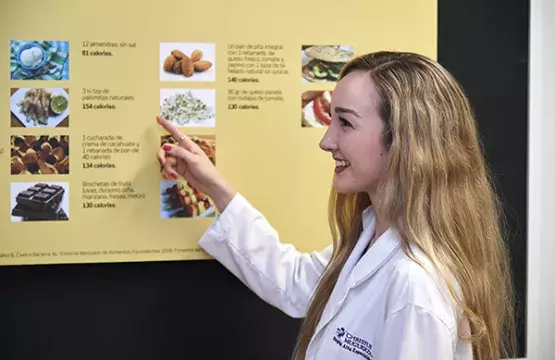Description
In our Nutrition career we have the CIEES level 1 accreditation, a guarantee that you will learn strategies to prevent and treat health problems.
We have 3 laboratories used by our students of: Food Science, Anthropometry and Gastronomy.
Our nutrition career has Level 1 accreditation in the Inter-institutional Committees for the Evaluation of Higher Education.
We have more than 8 years training professional nutritionists with extensive experience
We are accredited by CONCAPREN (Consejo Nacional para la Calidad de Programas Educativos en Nutriología A.C).
Objective
In our Nutrition career we train professionals capable of providing nutritional care to healthy and sick individuals individually or in groups or populations, through methods and techniques of research, evaluation and intervention that ensure the assessment, diagnosis, treatment, follow-up and evaluation. of nutritional therapy or intervention programs. As a bachelor of Nutrition (BN) you will be able to develop management processes in food services in accordance with official standards for sanitary control, disease prevention and health promotion.
Student Learning Outcomes
- You will apply the principles of food science, food systems, and food preparation techniques for the development, modification, and evaluation of recipes and menus, as well as of food products that are appropriate for the different population groups.
- You will use the nutritional care process to identify problems related to nutrition, make decisions, and determine and assess nutritional interventions, including nutritional medical therapy, disease prevention, and health promotion.
- You will analyze and assess community nutrition problems, and you will develop nutritional intervention programs through various strategies aimed at specific communities or the general population.
Bachelor of Nutrition. Recognition of Official Validity of Studies (RVOE) granted by the Mexican Secretariat of Public Education byin accordance with agreement 20110472 dated June 8, 2010. Effective as of April 2015.
Simulate curriculum
Check the courses you will take throughout your undergraduate program.
Download example Start simulation
Admission Profile
As an aspiring nutritionist, you must have:
- High humanistic sense and desire to serve others.
- Interest in development and growth within the field of caring for people at all levels of care.
- Sensitivity to the sui generis activities of the profession that include service, teaching and research within its different levels of care.
Graduate Profile
As a graduate of the bachelor’s degree in Nutrition, you will have developed the following knowledge:
- Growth and development of healthy individuals.
- Design of dietary regimes.
- Methods, techniques, and instruments to assess the nutritional status of healthy and sick individuals, as well as of groups and populations at risk.
- Individual intervention according to pathology and dietary prescription, or interventions in groups and populations according to various nutritional problems.
- Behavior-modification, orientation, and nutritional communication techniques.
- Interaction between the environment, diet, and lifestyles in health promotion and disease prevention.
- Evaluation methods for nutritional intervention programs.
- Official health control standards that regulate food services.
- Official clinical management standards.
- Management of food services.
- Nutritional information systems.
- Research on nutrition and food services.
- Food quality and safety.
- Standardization of dietary plans.

Upon completion of the degree program, you will have developed the following skills:
- You will assess the nutritional status of healthy and sick individuals, both for patients who have already received nutritional treatment and for those who are going to start treatment.
- You will assess nutritional problems in diverse groups and populations.
- You will guide patients and families on food plans.
- You will develop and evaluate programs that promote health and welfare.
- You will demonstrate the ability to communicate effectively by using oral, printed, visual, and electronic media and multimedia to maximize the education and training of the user population.
- You will plan and implement nutritional interventions that include diagnosis, prescription, goal setting, and treatment selection and management.
- You will establish evaluation and control actions for nutritional intervention programs for groups and populations.
- You will plan, organize, lead, control, and evaluate the activities of a food service operation.
- You will apply official standards to food safety and nutritional management.
- You will use information systems to optimize the management and control of food services operation.

By the end of your career in Nutrition, you will have developed the following attitudes:
- Cooperative with patients, families, and health personnel.
- Reliable in the fulfillment of the official standards established for clinical nutritional care.
- Committed to practicing their profession with the ultimate advances in the discipline.
- Reliable in the fulfillment of health expectations of the population benefiting from the nutritional program.
- Responsible in the use of the material, economic, and human resources in their care.
- Modifies decision-making that affects third parties in a responsible manner.

Field of work
As a graduate of the undergraduate degree program in Nutrition (LNU), you will be able to work as a(n):
- Nutritionist
- Clinical dietitian
- Pediatric dietitian
- Nutritional supervisor
- Nutrition specialist chef
- Nutritional advisor
- Researcher
- Dietary health program coordinator
- Nutrition program planner
- Food services supervisor
- Health promoter
- New product development consultant
- Food company consultant
Live an experience abroad
Have an academic experience abroad for a summer, a semester or a year.
See more¿Tienes dudas sobre la carrera de Nutrición?
Te resolvemos todas tus preguntas sobre la Licenciatura
La Licenciatura en Nutrición es un plan de estudios que tiene el objetivo de formar profesionales como tú, que puedan ser capaces de integrar todos los conocimientos, habilidades y competencias de la ciencia de la nutrición; con el fin de promover de una forma correcta el tipo de alimentación más saludable y sostenible para cada persona. Además, un nutriólogo también tiene las herramientas necesarias para brindar atención a individuos y poblaciones aparentemente sanos, en riesgo o con alguna alteración de la salud, así como innovar y emprender en la industria alimentaria y culinaria.
Aunque elegir una carrera universitaria es una decisión muy personal en el que influyen distintos factores como estudios previos, tendencias o necesidades requeridas por el mercado laboral en el momento, actualmente las ciencias de la salud tienen una gran oportunidad de desarrollo profesional
En el mundo y la sociedad cada vez son más requeridos especialistas que estén lo suficientemente capacitados con los mejores conocimientos y herramientas de estudio, además de tener el objetivo de preservar un buen estado físico y mental de las personas.
La Licenciatura en Nutrición es una carrera que ofrece la oportunidad de formar profesionales que logren crear y llevar planes de alimentación adecuada para los seres humanos, brindando así una buena calidad de vida y previniendo muchas enfermedades crónico-degenerativas.
Cursar el plan de estudios de Licenciatura en Nutrición en la UDEM tiene una duración de 4 años y medio, pues está compuesto de 9 semestres y tiene un total de 56 materias a cursar. Es un programa académico muy completo, el cual hemos trabajado en la Universidad de Monterrey de la mano de expertos en el área.
Este programa académico de Licenciatura en Nutrición tiene el objetivo de enfocarse en formar profesionales que quieren conocer más acerca de las habilidades y competencias de la ciencia de la nutrición, para promover una alimentación más saludable y sostenible.
La Licenciatura en Nutrición tiene materias de áreas obligatorias, electivas/concentración, de Prácticas y Proyecto de Evaluación Final (PEF), entre ellas se encuentran: Química Orgánica, Sistemas de Producción de Alimentos, Bioquímica Médica, Toxicología de Alimentos, entre otras.
La Universidad de Monterrey cuenta con un excelente plan de estudios, ya que su modalidad está diseñada para permitirte a ti como futuro alumno decidir el camino más adecuado para enriquecer al máximo tu currículum académico y también formativo.
Al acudir con un asesor para saber más acerca de la Licenciatura en Nutrición, podrás conocer un ejemplo de tu plan de estudios, utilizando un simulador en el que es posible experimentar cómo podrías organizar tus materias.
La Licenciatura en Nutrición tiene el objetivo de formar profesionales que estén altamente capacitados en la información de los alimentos y sus propiedades, así como también sobre el cuerpo humano y sus requerimientos de nutrientes, micronutrientes, entre otros elementos.
Esta información permite que un egresado de la Licenciatura en Nutrición pueda brindar una orientación correcta y guiar de manera racional a las personas sobre una asesoría alimenticia, tanto de forma individual como colectiva, tomando en cuenta elementos patológicos, económicos y socioculturales que condicionan las dietas.
Además, la carrera de nutrición también proporciona formación de calidad en otras áreas que también están asociadas, como la higiene, la salud humana en general y la nutrición infantil.
Los estudiantes y posteriormente egresados de la Licenciatura en Nutrición, se encargan de estudiar la nutrición en comunidades y sus grupos vulnerables, así como el funcionamiento de programas sociales relacionados con la alimentación. Sin embargo, su labor está más allá de elaborar planes de alimentación (dietas) para bajar de peso.
Comúnmente los nutriólogos, egresados en Licenciatura en Nutrición son profesionales de la salud capaces de brindar atención a diferentes sectores de la sociedad con alguna necesidad en materia de alimentación y nutrición.
Con el paso del tiempo, la carrera de nutrición se ha diversificado en muchos ámbitos, lo que ha llevado a sus profesionales a realizar una gran variedad de trabajos complejos que abarcan una multiplicidad de áreas y sectores de la salud pública o privada.
Al estudiar la Licenciatura en Nutrición en la Universidad de Monterrey te podrás desempeñar en diferentes puestos que van más allá de tener tu propio consultorio de nutrición, ejemplo de ello es trabajar como:
- Clínico-Hospitalaria
- Industria Alimentaria
- Docencia e Investigación en Alimentación y Nutrición
- Educación y Consejería Nutricia en diferentes grupos poblacionales
- Industria Culinaria y Farmacéutica relacionada a la Alimentación
- Nutrición e Innovación y Emprendimiento.
Generalmente quienes buscan estudiar la Licenciatura en Nutrición están interesados y comprometidos en una vida saludable, les llama la atención conocer las mejores dietas que incluyan alimentos saludables, al igual que aprender sobre la actividad física y sus beneficios para el cuerpo. Además, cuentan con una vocación de servicio teniendo el gusto por ayudar a los demás y generar un impacto positivo en comunidades o individuos específicos.
La Universidad de Monterrey, comprometida con el futuro de sus estudiantes, apoya el talento y la dedicación con una amplia oferta de becas y ayudas financieras para que los estudiantes puedan enfocarse en lo más importante: su educación y desarrollo profesional.
Explora las becas para la carrera de Nutrición: Visita nuestra sección de admisiones y becas para conocer todas las opciones disponibles.
Participar en un programa de intercambio durante la Licenciatura en Nutrición brinda una experiencia invaluable que mejora el currículum vitae (CV) y amplía los horizontes personales y profesionales. Estudiar en el extranjero permite adquirir nuevas perspectivas, desarrollar habilidades interculturales y fortalecer una red internacional de contactos. Además, esta experiencia puede ofrecer una ventaja competitiva en el mercado laboral, ya que demuestra la capacidad de adaptarse a nuevos entornos y desafíos.
🌍 ¿Te interesa vivir un intercambio? Descubre las opciones que la UDEM ofrece a sus estudiantes. Visita nuestra página de internacionalización y conoce más: Internacionalización UDEM
Professors of the Vice-Presidency of Health Sciences
Stories
Learn about the success stories of our graduates.










